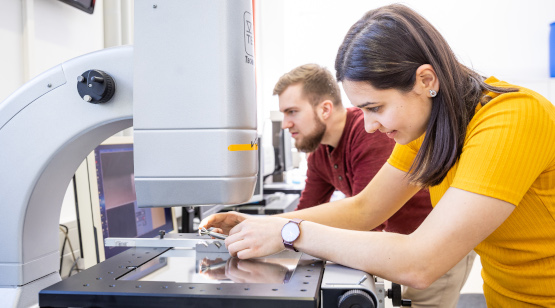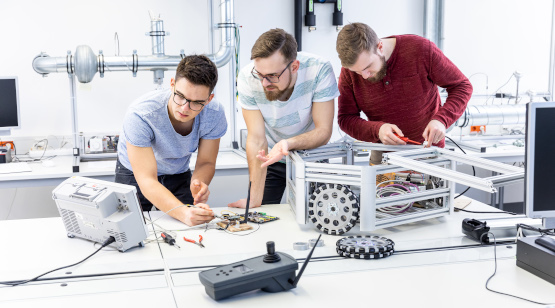
Electrical Engineering / Information Technology
Bachelor of Engineering
In the first semesters, scientific and mathematical basics are taught. These form the basis for an advanced examination of engineering technology. Important focal points are mathematics and physics. These topics are dealt with in several modules. Electrical engineering is also covered in the first semesters. Further modules are:
- Electronic components
- Circuit design
- Measurement technology
- Control engineering
- Technical English
After the third semester, students choose one of the three specialisations: Automation Technology and Robotics, Communication and Circuit Technology or Computer Engineering and Artificial Intelligence. Depending on which area is chosen, the courses offered also differ. A list of the modules is provided below. You can find the contents of the courses in the module handbook. In the higher semesters, compulsory elective modules are offered, so you can partly organise your further studies yourself.
A special feature of studying at the EAH Jena is our mentoring programme: Throughout your studies, we will accompany you - if you like - within the framework of our mentoring programme. You will receive tips for everyday university life from experienced students from the higher semesters and can also gain insights and connections into professional practice through contacts with alumni. And you'll notice that our department has a family atmosphere with short lines of communication and quick solutions to problems!

The aim of automation technology and robotics is to automate machines or systems, i.e. to operate them autonomously and independently of humans. This is mainly about measuring, controlling and regulating technical processes.
If you want to know how a robot or an anti-lock braking system (ABS) and parking aids work in a car, then this is the right place for you!
The main focus of training in automation technology and robotics is therefore on the basic techniques for practical implementation (measurement, control and instrumentation and automation systems) as well as on control engineering methods (modelling, digital control systems).
Further focal points are electrical drives as the basis for robot systems and mobile robotics, as well as electrical measurement technology and the various sub-areas of electronics. Electronics, from microelectronics to power electronics, is the basis for the development of components and devices in automation technology.
You can find more information about the degree programme, the individual modules or the module plan in the download area on the department page.
Modules of the specialisation:
- 4th semester: Image processing, control technology PLC, electrical drives
- Semester 5: Modelling and simulation, robot systems, automation technology
- Semester 6: Mobile robotics, fieldbuses, LAN, optoelectronics, digital control systems

Communication and circuit technology deals with processes, algorithms and devices for the production, transmission and playback of media content. You want to know how the transmission of your text messages works or develop an MP3 player yourself? Then you've come to the right place!
The practice-oriented Bachelor's degree programme provides you with the prerequisites to help shape technological progress and helps you develop your skills in subjects such as mathematics, physics, electrical engineering and computer science. The course will provide you with the necessary knowledge, skills and abilities in the fields of communication and circuit technology. This includes the principles, procedures and systems of both communication and circuit technology. On the one hand, the theoretical basics and, on the other hand, practice-oriented, application-ready knowledge are taught.
You can find more information about the degree programme, the individual modules or the module plan in the download area on the department page.
Modules of the specialisation:
- 4th semester: Device construction, communication networks, hardware description
- 5th semester: Transmission technology, high-frequency technology I, integrated circuit technology
- Semester 6: High-frequency technology II, optoelectronics, image processing, system modelling

Computer Engineering and Artificial Intelligence deals with the linking and interaction of hardware and software and their integration into devices, machines, systems, vehicles and consumer goods. You want to know how the onboard computer of a car works or develop a remote control for all your technical devices? Then you've come to the right place!
The specialisation in Computer Engineering and Artificial Intelligence involves the realisation of systems consisting of hardware and software that control, for example, industrial plants, vehicles, televisions, household appliances and smartphones. Computer engineering deals with the complex interactions between chips and software. Students learn to develop and operate embedded systems in project work. In the field of artificial intelligence, you will learn about machine learning, especially image processing.
You can find more information about the degree programme, the individual modules or the module plan in the download area on the department page.
Modules of the specialisation:
- 4th semester: Image Processing, Software Technology, Basics of Machine Learning
- Semester 5: Mobile Computing, Computer Logic, Computer Vision
- Semester 6: Machine Learning in Image Processing, Fieldbuses, LAN, Real-Time Operating Systems, Hardware Description


